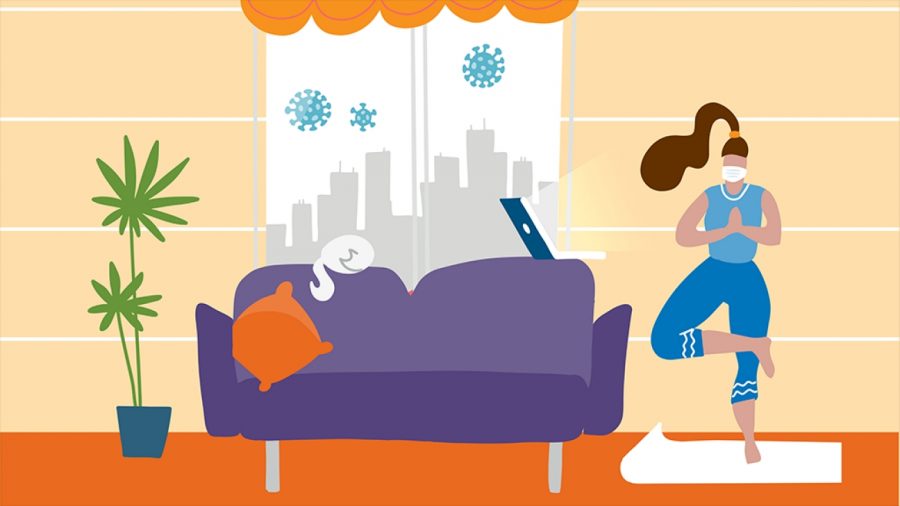Zoom Fatigue No More
How to Combat Stuck at Home Fatigue
Last updated October 7, 2020
For months, much of the world has been stuck at home due to the spread of COVID-19. People are itching to get outside and return to normal, everyday activities. Gyms, parks, malls, and some beaches have been closed in order to keep people from gathering in such places where social distancing can’t typically be practiced. Staying at home has allowed people to avoid being infected by others who may unknowingly have contacted COVID-19 simply due to the fact that the virus cannot spread or survive without a place to go. But what has all of this isolation from friends and the public in general done to our mental health?
Quarantine fatigue is a real thing that people are dealing with everyday. Mary Fristad, a psychologist at The Ohio State University Wexner Medical Center, describes it as being very fatigued at the end of the day for many reasons due to the sudden change and unpredictability of our lives. Isolation also contributes to such fatigue. It can make people feel very lonely causing anxiety and stress. A healthline.com report suggests that people need a certain amount of stimulation in order to be most efficient and yet there also is a constant “overstimulation” from new reports promoting uncertainty. All of this can be very tiring.
Physical activity is a great way to boost your energy and also lead to a healthier lifestyle. Harvard Health recommends exercising approximately 30 minutes a day. You can join a virtual exercise class (Emi Wong, Vicky Justiz), go for a bike ride, take a walk or run, or even do yoga!
Senior Kate Finn said, “At the beginning of lockdown, I definitely had quarantine fatigue. Recently, it has been easier to adjust to our world, but there are definitely some days where lockdown fatigue hits badly. Walking my dog around 30 minutes a day is a great way for me to get away from the computer screen and get outside. Swimming also helps me to get active and it includes a nice change of scenery.”
Baking or cooking have become therapeutic escapes. This activity requires a lot of patience, skill, and effort making it a great way to cope with stress. There are many different recipes to try with a variety of websites to guide you, including BBC GoodFood which provides many at-home recipes. Though some of this may sound like a cure for basic boredom, it also provides a different form of stimulation to replace what has been taken away due to the pandemic.
Proper sleep is one of the most important things when it comes to our mental health. The CDC states, “Be consistent. Go to bed at the same time each night and get up at the same time each morning, including on the weekends. Make sure your bedroom is quiet, dark, relaxing, and at a comfortable temperature. Remove electronic devices, such as TVs, computers, and smartphones from the bedroom. Avoid large meals, caffeine, and alcohol before bedtime.” It is recommended to get seven to nine hours of sleep each night. This is a good practice in general, but can truly help during quarantine, it will help you focus better during these uncertain times.
Following a balanced diet can be a difficult thing to do, especially in the time we are living through right now. Some tips to help get started on pursuing a healthy diet include: being strategic with the ingredients you use, being aware of portion sizes, limiting sugar and fat intake, and hydrating.
Quarantine may not motivate you to want to do anything active, but going outside for at least 20 minutes a day can lead to a much more positive headspace. Fresh air can send plenty of oxygen to the lungs and blood which can improve your ability to focus. Taking a walk around your neighborhood or taking a quick break in your backyard can help your state of mental health immensely. It might also be beneficial to allot yourself a workspace away from the rest of your family, so you can properly focus or have time to yourself.
As humans, we thrive by having social interaction with others, and that is especially important now. You may feel very disconnected from the world at the moment, but it is so important to maintain social interaction. You can call or mail letters to family members or friends. Zoom or FaceTime are great ways to talk to multiple people at once while remaining socially distant.
Senior Sofia Gomez says, “I love to FaceTime my friends to catch up and eat lunch together virtually. I also enjoy having virtual Netflix parties with them.”
This is a surreal time we are living in, and it is super crucial to remember to take care of yourself so we can all get through to the other side of the pandemic happy and healthy.

